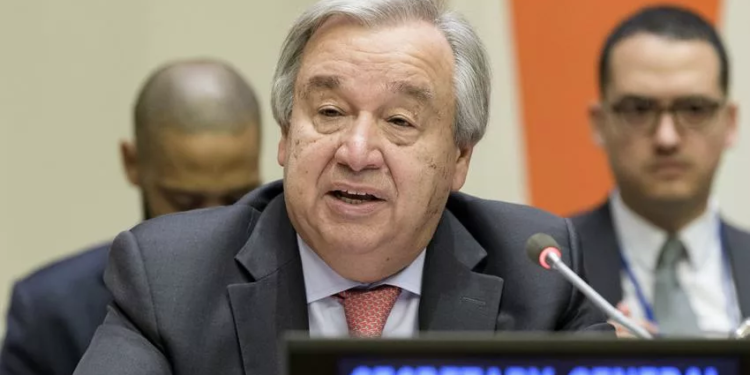Ahead of the 2023 general elections in Nigeria, the United Nations (UN) has strengthened its message against hate speech in Nigeria and acts that might lead to profiling and violence against people based on their ethnic group, language, religious affiliation or voting choices.
The UN also declared its intention to activate the instruments within its disposal to sanction any individual or group that spread hate speech or hate action during the electioneering campaigns, even as it warned politicians in Nigeria to eschew such acts to prevent major crises in the country.
This message was the crux of a press conference organized by the UN System in Nigeria to Commemorate the International Day in Memory of the victims of the Holocaust, held at the UN House, Abuja on Thursday.
The theme of this year’s Holocaust Remembrance Day, which is celebrated on every January 27, is “It started with words: How hate speech can cause real harm.’’
United Nations Resident and Humanitarian Coordinator in Nigeria, Mr. Matthias Schmale, said it has become incumbent on Nigerian leading political figures to desist from speaking words that may plunge the country into chaos and war, stressing that the Holocaust atrocity, in which 6 million Jews were killed by Nazi Germany, during the World War 2 (1939-1945) started with hate speech against the Jews.
Schmale said: “In Nigeria, with national elections imminent, we must be watchful for any upsurge in hate speech and disinformation, particularly if tensions were to rise between political, regional, or ethnic groups.
“We must be vigilant because words can be weaponized and lead to physical harm. From historical experience, we know that atrocities have been preceded by hate speech. The Holocaust is, of course, the starkest example of this. But the 1994 genocide against the Tutsi in Rwanda and the 1995 genocide in Srebrenica also serve as warnings to us.”
He added that “hate speech is a threat to our cherished values, to the cohesion of our societies, and to the lives of our most vulnerable, especially women and girls. Undoubtedly, the internet and social media have supercharged such risks. We need to strengthen the resilience of our young people against the ideologies of hatred and educate them on the dangers of disinformation.
He called on Nigerian leaders to use the Holocaust Remembrance Day, to honour the memory of its victims by heeding the lessons of history and pledging to always be vigilant in upholding human rights and dignity for all.
“We remember the six million Jewish men, women and children, as well as the Sinti and Roma, the people with disabilities, and the countless others, who were killed by the Nazis and their collaborators.
“We mourn the loss of so many and so much during the horrors of World War Two. We reflect on man’s inhumanity to man and renew our promise of ‘Never Again,” he said.
Nigeria has fought a civil war (1967-1970) which killed nearly three million people. Although the country survived the secessionist war, the nation has been bedeviled by numerous crises including politically –motivated crises that have led to the death of thousands of people and destruction of property in many parts of the country caused by hate speech and hate action.
The 2023 election in Nigeria presents an uncertain moment in the history of the country and judging by the nation’s history of election -related violence and intimidation, the UN was apt to issue warnings to the political figures and citizens to a avert crisis that might consume the nation.
In his message on the day, the UN Secretary General, António Guterres Said: “As we mourn the loss of so many and so much, we also recognize that the Holocaust was not inevitable. No genocide ever is.
“It was the culmination of millennia of antisemitic hate. The Nazis could only move with calculated cruelty from the discrimination of Europe’s Jews to their annihilation because so few stood up, and so many stood by.
He noted that the Holocaust was encouraged by the deafening silence – both at home and abroad that emboldened the perpetrators. “The alarm bells were ringing from the very beginning about hate speech and disinformation, contempt for human rights and the rule of law, the glorification of violence and tales of racial supremacy and disdain for democracy and diversity,” he said.
Also speaking on the day, the Israeli Ambassador to Nigeria, Michael Freeman lamented that it is quite unfortunate that many in the world today believed that perhaps the Holocaust never happened or perhaps it was exaggerated.
Freeman said the best way to ensure that the sad history of Holocaust is never repeated is by ensuring that the story is told by survivors to the rest of the world, adding that people must be properly educated.
He said it is sad that 20 percent of those in Europe where the event happened believed it never happened and about 70 percent felt it was perhaps exaggerated.



